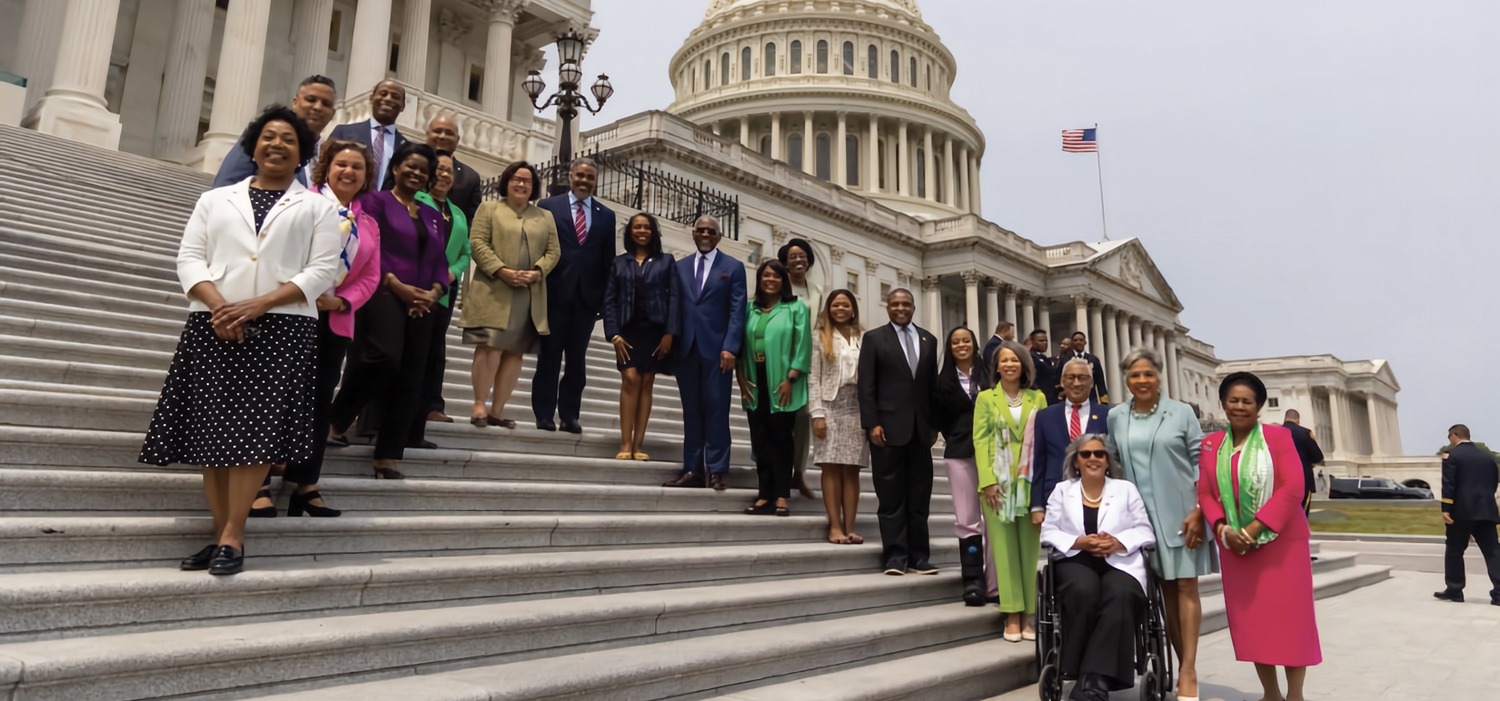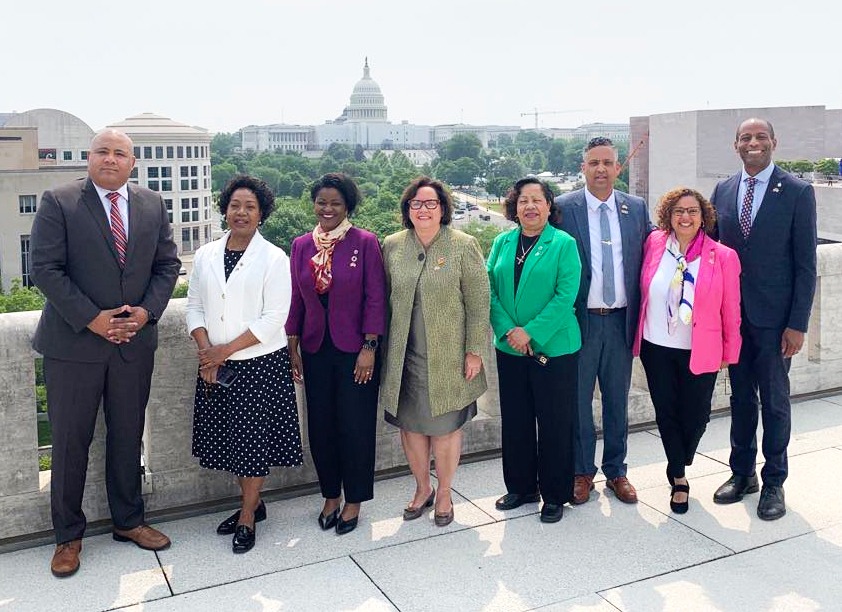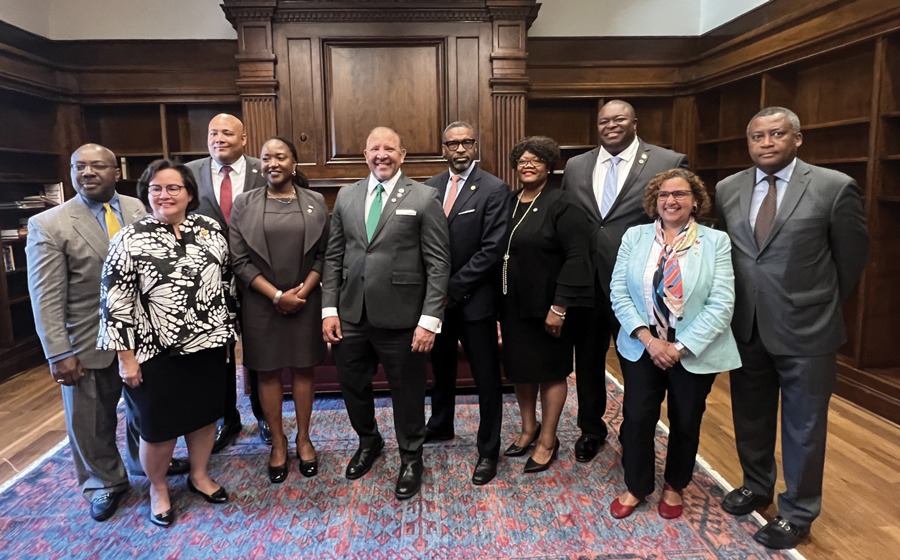Making Black History in Washington: Founding the Overground Railroad

Rosemary Moodie and Josh Dadjo
For Black Canadian leaders, any visit to Washington, D.C., engages both the head and the heart. Washington is the city of Rev. Martin Luther King’s “I Have a Dream” speech and the imposing monument to Dr. King standing watch over the National Mall. It is home to a White House built by Black slaves and lived in by a Black president and his family for eight years. It is also D.C.; a center for Black excellence, the Black cultural and intellectual home of Duke Ellington, Marvin Gaye and Howard University.
Crucially, it finds itself today as a hotbed of political debate and unrest and at its core is the United States Congress, the legislative body that is a center of gravity for both the city and the political universe at large. The frontline troops in that battle have, for more than half a century, been the members of the Congressional Black Caucus (CBC), consistently stepping up to make this theatre work for African-Americans.
Known as the “conscience of the Congress”, the Congressional Black Caucus was founded in 1971 by 13 members of the United States House of Representatives. The Caucus would go on to have significant impacts, from allying with the civil rights movement to advocating for the end of apartheid in South Africa, and much more. Today, the CBC includes 54 representatives, two non-voting delegates and two senators. Its members have gone on to hold the presidency and vice-presidency of the United States and lead the Democratic party in the House of Representatives. They currently hold senior positions in the Congressional leadership.
The fight for civil rights by Black Americans has been an inspiration for Black people throughout the world and has influenced how so many approach politics within their own domestic context. Canada is no different. In 2015, the Canadian Parliamentary Black Caucus (PBC) was founded with a similar goal to that of its Congressional counterpart — to advocate for Black Canadians, amplify their voices and elevate their priorities in the public sphere. Today, the caucus is led by an executive of 14 senators and Members of Parliament, including two ministers, a parliamentary secretary and members of the leadership of various groups and committees in both chambers of Parliament.
It was so inevitable and natural that the PBC would meet with the CBC — a well-established, sophisticated and accomplished caucus — that when it finally happened in May, it felt both overdue and preordained.
And historic.

After months of planning, we arrived in Washington D.C. with a delegation of eight members and an ambitious agenda. The members of the delegation were: Senator Rosemary Moodie (ON) and MP Michael Coteau (Don-Valley East), co-chairs of the caucus as well as; Senator Sharon Burey (ON), Senator Bernadette Clement (ON), MP Greg Fergus (Hull-Aylmer), Senator Amina Gerba (QC), MP Matthew Green (Hamilton-Centre) and Senator Marie-Françoise Mégie (QC).
On arrival in Washington, we were hosted at the Canadian Embassy for a morning briefing. The Embassy’s landmark Arthur Erickson-designed chancery and prime, Pennsylvania Ave. location are well-known to Canadians, especially Policy readers, many of whom have served as diplomats in the building. We were all struck by the beautiful, imposing structure that stakes out Canada’s presence at the centre of American democracy.
Deputy Head of Mission Arun Alexander and his team were great hosts and provided us with key insights on the dynamics of the Canada-US relationship. We were especially intrigued by data that outlined the deep economic ties between Canada and the United States at a state-by-state, district-by-district level.
We then headed over to the US Capitol, where we were ushered into the congressional dining rooms. We were greeted by Representative Barbara Lee, currently a candidate for the Democratic nomination for Senate in California. Rep. Lee, who emerged out of the civil rights movement as a Black Panther before going into politics, has been a member of Congress for over twenty years. She chaired the CBC from 2005-2009 (the chair changes every session of Congress) and was the lone vote against the authorization of the use of force in Iraq following the September 11th, 2001 terrorist attacks. Rep. Lee embodies the legacy and stature of the CBC. It was truly an honour to meet her.
The luncheon was a memorable event. We were joined by current CBC chair, Rep. Steven Horsford, Vice Chair Yvette Clarke and Rep. Meeks, who is the ranking member on the House Foreign Affairs committee, among many other new and longstanding members of the CBC. Their caucus is diverse in its experience and backgrounds, but one could not help but note the warm collegiality and almost family-like dynamic of the group. Both chairs addressed the assembled parliamentarians, and all members had the opportunity to introduce themselves.
Two members of our delegation, Greg Fergus, MP from Hull-Aylmer, and Bernadette Clement, Senator for Ontario, presented to our American counterparts about Black Canada. They eloquently walked us through the longstanding history of Black Canadians in Canada, highlighting our historical contributions, and the dynamic diversity of our population.
In the middle of his remarks, MP Fergus pulled a crisp $10 bill featuring the face of Viola Desmond from his pocket as an example of the impact our Canadian caucus has had, which excited our American counterparts, who’ve been trying for many years to replace slave owner Andrew Jackson with Harriet Tubman on the US $20 bill.
Outside on the iconic Capitol steps, CBC members took selfies with the $10 bill as onlookers stopped to ask what the occasion was. One older Black woman stopped and asked a member of our delegation about the commotion and was moved to hear of this historic meeting taking place.
We were then treated to a tour of the Capitol. In a city of grand monuments, the Capitol stands above and beyond them all. Our tour guide brought us through from the Old Supreme Court Chamber and Senate rooms to the majestic Rotunda and Statuary Hall, with a focus on Black history. Our guide spoke passionately about the building he loves and about the horrifying events of January 6th that defaced it. We truly appreciated this experience.

That evening, we were hosted by the Deputy Head of Mission for a reception at the Canadian Embassy. We were joined by members of Congress and their staffs, civil rights leaders and community leaders. Following his remarks, Chairman Horsford provided the proverbial exclamation mark: a certificate of Congressional Recognition to mark the visit of the Parliamentary Black Caucus to the United States.
Day two of our trip began with a private tour of the Smithsonian National Museum of African American History and Culture. We arrived early, before the spectacular, David Ajaye-designed building on the National Mall was opened to the public. Our tour guide was Renée Anderson, the museum’s collections manager, and she told us about the stories behind the exhibits and displays. Walking through the beginning of slavery to the modern-day struggle for justice and equality by Black Americans was an incredibly moving experience, one from which no one could leave indifferent or unchanged. Washington D.C. is a city of museums, but we can’t imagine a space more beautiful and profound in this city then that museum.
Later that day, delegates would engage a total of nearly a dozen times with CBC members in smaller meetings, comparing notes on our policy and political contexts, successes and failures, and sowing the seeds for future collaboration. We have no doubt that this was the beginning of a warm and rich friendship.
On Day three, we made our pilgrimage to Howard University, America’s most prominent Historically Black College or University (HBCU), born in 1867 — as old as Canada — and alma mater to, among others, Supreme Court Justice Thurgood Marshall, writers Zora Neale Hurston, Ta-Nehisi Coates and Nobel laureate Toni Morrison, and Vice President Kamala Harris. We were welcomed in the Founder’s Library, where Marshall prepared his winning arguments for Brown v. Board of Education (1954) and where Harris prepared for her 2020 debate with then Vice President Mike Pence. We had a great discussion with university leaders about historically Black colleges and universities, and some of Howard’s international programs. We felt the history of the space and the passion of our interlocutors as they spoke about the “mecca” of Black education in the United States.
We were given a tour of the campus, with a stop at the Chadwick A. Boseman College of Fine Arts, named for the beloved late Black Panther actor, where our delegation was treated to a surprise meeting with Dean Phylicia Rashad and Assistant Dean Denise Saunders Thompson.
Over lunch, the delegation met with Marc H. Morial, president and CEO of the National Urban League; NAACP President Derrick Johnson; Melanie Campbell, President and CEO of the National Coalition on Black Civic Participation and convener of the Black Women’s Roundtable; Damon Hewitt, President and Executive Director of the Lawyers’ Committee for Civil Rights Under Law; Dr. Shavon Arline-Bradley, President and CEO of the National Council of Negro Women; and Janai Nelson, President and Director-Counsel of NAACP Legal Defense Fund.
The meeting included a moment of silence to mark the third anniversary of the murder of George Floyd and a thorough discussion on the status of civil rights on both sides of the border. It was evident that there are many shared challenges and areas for collaboration, and we hope this is the first step toward bringing together leaders from both sides of the border. The leaders concluded by making statements to the press in a historic joint media availability on Howard’s campus.
The resounding feeling after this trip was the deep sense that this was only the beginning. There is so much more to do and, we believe, a willingness to do it. Meeting counterparts in and beyond Congress has opened our eyes, not only to their willingness and interest to work with Canadians, but their perception of us as strong and reliable partners in the fight for equality. It is fitting to conclude with Senator Moodie’s words to her American colleagues:
“We all know that one of the most important historic links between Canada and the United States is the underground railroad. When I look around this room, and see the power, influence and passion of both of our caucuses, if I may be so bold, I see that this railroad is no longer underground.
This link now flows both ways, providing opportunities for freedom and advancement if we work together.”
The Hon. Rosemary Moodie is a senator from Ontario, representing Toronto since 2018. She is the co-chair of the Parliamentary Black Caucus.
Josh Dadjo is Director of Parliamentary Affairs to the Hon. Rosemary Moodie. He is also a PhD student in Public Policy at Carleton University
